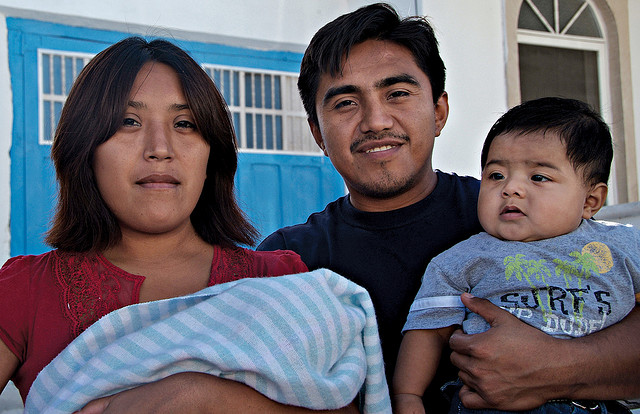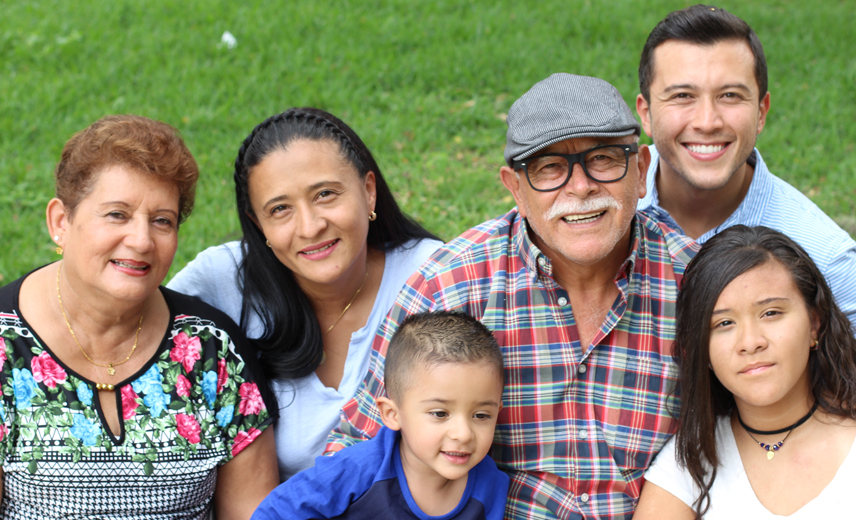(UnidosUS) —
By: Laura Vazquez, Director of Immigrant Integration, and Gary Sang, Immigrant Integration Program Manager
UnidosUS has advocated that the Biden-Harris administration should use various legal tools that would place hundreds of thousands of immigrants with deep roots in the U.S. on the path to permanence and eventual citizenship. We celebrate the Biden-Harris Administration’s commitment to promoting family unity within the immigration system by announcing on June 18, 2024, a new process to consider, on a case-by-case basis, requests for parole for certain noncitizen spouses and stepchildren of U.S. citizens. Following the announcement, UnidosUS and its Affiliate Network and partners rolled up our sleeves to focus on implementation to turn a policy announcement into reality for families.
In preparation for the implementation of the “Parole in Place (PIP) Process for Noncitizen Spouses and Stepchildren of U.S. citizens,” UnidosUS has met with agency officials and shared information with Affiliates. At the UnidosUS Annual Conference, Affiliate leaders heard from Raul Raymundo, Executive Director of our Affiliate The Resurrection Project, and Tom Perez, Senior Advisor and Assistant to the President, on actions Affiliates could take to prepare to implement the policy.
Immigration policy is not self-executing, and community-based immigration legal service providers are critical to providing our community with accurate and reliable information and providing qualified, low-cost application assistance. In the weeks leading up to today’s opening of the application process, UnidosUS Affiliates have hosted information sessions to explain the policy and provide general eligibility information. Their trust with the community has helped to disseminate accurate information and prevent unscrupulous actors from defrauding community members.
Announcement Overview
 USCIS and DHS have worked diligently to set up the new process that will help certain noncitizen spouses and children apply for lawful permanent residence – status that they are already eligible for – without leaving the country. USCIS will consider, on a case-by-case basis, requests for certain noncitizen spouses of U.S. citizens who have been continuously physically present without admission or parole in the United States for 10 years or more, have no disqualifying criminal convictions, do not pose a threat to national security and public safety, and have no issues of immigration inadmissibility that would disqualify them from a green card.
USCIS and DHS have worked diligently to set up the new process that will help certain noncitizen spouses and children apply for lawful permanent residence – status that they are already eligible for – without leaving the country. USCIS will consider, on a case-by-case basis, requests for certain noncitizen spouses of U.S. citizens who have been continuously physically present without admission or parole in the United States for 10 years or more, have no disqualifying criminal convictions, do not pose a threat to national security and public safety, and have no issues of immigration inadmissibility that would disqualify them from a green card.
If approved for parole, these noncitizen spouses and stepchildren will generally be able to apply for lawful permanent residence without leaving the United States and be processed by a U.S. consulate overseas.
Eligibility Requirements
To be considered for a discretionary grant of parole under the new process, noncitizen spouses must:
- Be present in the United States without admission or parole;
- Have been continuously physically present in the U.S. since at least June 17, 2014 through the date of filing the parole in place request;
- Have a legally valid marriage to a U.S. citizen on or before June 17, 2024;
- Have no disqualifying criminal history and submit biometrics, undergo required background checks and national security, public safety, and border security vetting, and be found not to pose a threat to national security and public safety.
- Meet other legal requirements, including providing supporting evidence and paying a fee.
Noncitizen children may also be considered for a discretionary grant of parole under the new process. Noncitizen children who are stepchildren of U.S. citizens must:
- Be present in the U.S. without admission or parole;
- Have a parent who entered into a legally valid marriage with a U.S. citizen on or before June 17, 2024 and before the child’s 18th birthday and must have been unmarried and under the age of 21 as of June 17, 2024;
- Have been continuously physically present in the U.S. since at least June 17, 2024 through the date of filing;
- Have no disqualifying criminal history and submit biometrics, undergo required background checks and national security and public safety vetting, and be found not to pose a threat to national security or public safety.
Applications will be accepted via online submission starting on August 19, 2024, and UnidosUS, our Affiliate Network and partners will be monitoring the implementation process. We encourage interested parties to stay up to date on this process by visiting this USCIS page and the Frequently Asked Questions page.
Seeking Legal Assistance
Prospective applicants can seek assistance from trusted community-based organizations and legal practitioners specializing in immigration law. These resources can provide guidance on document preparation, legal advice and navigating the application process. Reach out to local nonprofit organizations or immigration lawyers for case-specific support and advice.
- Ready to Stay is a national coalition coordinating implementation efforts by centralizing resources. Its website includes a searchable directory of over 1,000 free or low-cost nonprofit immigration legal service providers nationwide.
- UnidosUS Affiliates with immigration legal services programs are screening prospective applicants, conducting community education sessions and preparing to assist eligible applicants. These Affiliates include CASA Inc., TODEC Legal Services, Latin American Association and The Resurrection Project (English) (Spanish) among others.
- American Immigration Lawyers Association (AILA) is a professional association and their directory includes immigration attorneys with varying specialties and language proficiency across the United States.
- Hotlines: The Texas Immigration Law Council is operating a hotline through August 26, available daily from 9 AM to 9 PM CT. Texas residents can call 956-815-2827 to reach them. Additionally, the Immigrant Resource Hotline in Houston, Texas is open Tuesday through Friday from 9 AM to 5 PM CT at 1-833-468-4664.
Beware of Notario Fraud and Anyone Engaging in the Unauthorized Practice of Immigration Law
In the United States, only an attorney licensed to practice law in the U.S. or a Department of Justice accredited representative working at a Department of Justice recognized organization can provide legal advice and representation. Prospective applicants must protect themselves from scams and fraud, stay informed and vigilant.

The Importance of PIP and Its Implementation
The Parole in Place (PIP) process for certain noncitizen spouses and stepchildren of U.S. citizens offers a pathway to lawful permanent residency and strengthens family unity in mixed-status households. This measure helps families stay together by alleviating the fears and burdens associated with separation due to immigration status.
Moreover, noncitizen individuals in mixed-status families contribute significantly to the U.S. economy, often filling essential jobs and by paying billions in taxes. If granted U.S. citizenship, their economic contributions would increase even further. Supporting these families through legal pathways not only promotes family unity but also recognizes their valuable economic impact.
However, to fully realize these benefits, effective implementation of the process requires federal investment in robust support services and application assistance. Adequate outreach, funding and resources are essential for the successful execution of this program and for providing equitable access to all eligible families. Furthermore, we will continue to advocate for and call on the Administration to expand the removal of additional barriers to pathways to legal status for long-residing undocumented immigrants, including Dreamers, spouses of U.S. citizens and others in mixed-status families, which is the top immigration policy priority for Latino voters.
—
Read More News from UnidosUS
